You never forget the smell of charred human flesh. It permeates your skin, your hair, your nose and your mind. It never leaves. You may try to describe it, but there is no equivalent. Not barbecue, not melted plastic, not wood; the smell of the flesh of a once-living human being stands on its own. Even after thirty years, my mind holds the smell in its broken places.
They said it was a Molotov cocktail thrown into the house because of a drug deal gone bad. The man who was the target jumped out a window and left his girlfriend and children behind. The fire consumed everything.
The five victims arrived in the emergency department where I was one of two attending physicians. Four were unidentifiable, hunched over in pugilistic positions as if fighting death. One, a girl of about seven, was alive, with second and third-degree burns over her entire body. My team and I tried to save her.
Have you ever tried to intubate a burned face? The blackened skin flakes, or the pinkish skin slides off wherever you rest your hands. Pink flesh oozes, but white skin that feels like leather is worse: a third-degree burn that has destroyed every layer of the skin. Placing the needles used to start central IV lines, we had to use force to break through the skin. To find the urethra for the Foley catheter, we had to use feel alone.
We failed to save her, of course. Honestly, we didn’t try all that hard, knowing that she had little chance of survival. But she was a child and had come to us alive. It wasn’t our choice to make.
It was time to notify the family. I entered, alone, a large room filled with family and friends, all people of color. An elderly woman, clearly the matriarch, sat on a chair amid the crowd. I knelt in front of her and held her hands.
“I’m so sorry,” I said. “We weren’t able to save your daughter and grandchildren.”
I didn’t see it coming, the foot that kicked me hard in the chest. The dead woman’s distraught sister, unable to contain her suffering, had lashed out. On my back, I crab-crawled to the door, where a security guard, drawn by the cacophony of grief, pulled me to safety.
Back in the ED, it was as if nothing had ever happened. I approached the department director, who had come in for the trauma alert.
“I think I need a physical exam,” I said.
“Why? It’s busy, and I need you back at work.”
“I’ve got a shoeprint on my chest, and the arm I used to protect my face is getting a nasty bruise. You know I’m on blood thinners. And I’ll need documentation for the police report.”
“What police report?”
“The one I’m making for assault.”
He snorted and turned away. “Fine. Do what you want.”
The exam was brief, and I never even thought to ask for a chest X-ray to check for bleeding around my heart. I just wanted out of the ED.
I was expected to finish my shift, even though another physician and a physician’s assistant were there—but over the rest of that shift, I began to come undone. I couldn’t think clearly about the patients; I felt anxious and shaky. Throughout the remainder of that night, it was as if I were sleepwalking.
I don’t know how I made the hour-long drive home in the morning. I shampooed, scrubbed, and snorted water, but that smell of burning flesh clung to my pores. After a few stiff drinks—the only way I could imagine to ease the panicky feeling in my body—I got a few restless hours of sleep. I suspected that I had another shift that night, but couldn’t be certain. I was on autopilot: home, sleep, eat, work.
After less than four hours of sleep, the assistant director called.
“How are you feeling?” he asked.
“Tired and sore.”
“Well, are you coming to work tonight? It would be difficult to find someone to replace you at the last minute. A real imposition.”
Amid the remaining stench, something inside of me broke into pieces.
Of course I went to work. That’s what we’re expected to do.
The director called the next day, once again interrupting my fitful sleep.
“The hospital doesn’t want you to press charges,” he said. “It’s bad publicity; they say it’s cultural and don’t want to offend anyone. Of course, I’ll support you, but there’s a lot of pressure on me.”
“The hospital’s statement is racist,” I said. “I know of no culture that supports assault. I’m doing it.”
The pressure relented, but the pull on my sanity remained. Eventually, the DA and I agreed on a modest fine for the woman.
Later, mulling over the hospital’s response, I began to think that I’d missed something. Wasn’t this a big deal? Shouldn’t they have offered me some trauma counseling?
From their point of view, I realized, the answer was no. An incinerated child and an assault simply affected business; my personal well-being was irrelevant.
Meanwhile, the stench was always there in the back of my mind. I began to shake whenever I reached the entrance of the ED. I could barely step into a room with two other people before feeling the walls close in, and my reaction to people of color was an aversion so strong that it took all of my courage even to say hello. I was mean and angry to everyone—colleagues, staff and patients. I drank. I sought counseling on my own, but my work hours interfered, and for financial reasons, I couldn’t cut back on them.
The stench and the fear followed me from job to job for twenty years. Miserable in a career I’d once loved, I was the “disruptive” physician. I was fired, hired and fired again until I couldn’t do it anymore.
Was I simply a mean and difficult person? No: I had PTSD, which back in the early Nineties was often viewed as not an actual syndrome.
I never returned to clinical work. Instead, I went to graduate school for a master’s degree in creative writing and found relief in bottles of white wine. Then, in 2016, my beloved father—my rock, my strength—passed away.
I taught for two years at the local medical school, but I was drinking steadily by then. By the time I found sobriety, the administration and I had mutually agreed that the job was no longer mine.
I approached my doctor for help, and he arranged for a respected therapist to see me. A psychiatrist adjusted the antidepressant medications I had been taking for most of my life.
As an atheist, I was not comfortable with Alcoholics Anonymous. A friend introduced me to Buddhist Recovery, and I found a spiritual home and became a serious student of the dharma.
But it wasn’t until I put this story—the whole story—on paper that I felt healing begin.
Was my PTSD related to the dead children? The uselessness of their deaths caused by the drug culture? The physical assault?
I don’t believe so.
My PTSD stemmed from those moments without compassion from my physician colleagues. From the avarice of the hospital. From my ingrained training to ignore the needs of my body and mind. From my belief that I deserved that sort of treatment.
That is the odor I still carry, although it’s fading. I know now that I deserved, and deserve, to be treated with understanding and compassion. I realize that I don’t need anyone’s permission or approval to take care of myself, and that I have a right to say, “No, this is not an acceptable way to treat me.”
In writing this reflection, I found a freedom from suffering that I never expected.


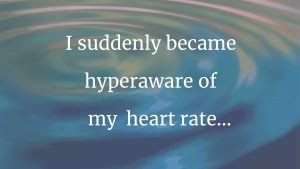

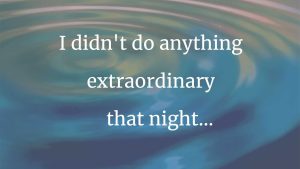
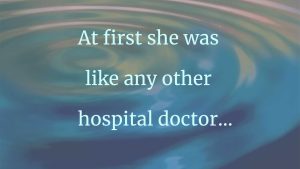
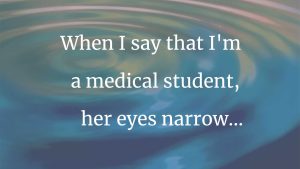
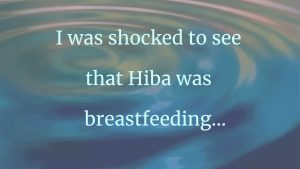
13 thoughts on “Burnt”
Thank you for writing this touching story of your experience. The lives of our patients and medical outcomes deeply affect our emotional and physical wellbeing that we are often taught to ignore in the plight to continue patient care and completing a shift. I hope that we can teach other, our medical students, our residents and our patients that we too are human beings deeply affected by the tragedies of others.
I am so sorry that you were treated this way. You did not deserve it. You deserved better. The medical system in this country has much work to do.
I hope you find continued healing and peace.
I was shaken to the core by your story. I’m sorry you had to suffer for so many years without receiving empathy and support from people who should have been there for you. What is wrong with us??? It sounds like you finally were able to experience some healing. I hope your healing continues so your peace may become complete.
Dear Jetta, like you, I was “ shaken to the core” from hearing this story. As a Registered Nurse who ( years ago) has taken care of a large family whose house burned with several family members in it, I reflect on the anguish I felt for this family and those who survived but were dealing with their grief and sorrow.
I pray for all medical physicians/ nurses, and ancillary staff that when presented with these tragic and traumatic instances, that we will all be cognizant and caring for one another as we are required to be for our patients. (“ Above all, do no harm”). Body, Mind, Spirit!
How much we lose when our profession does not see us as people who need care as much as our patients do. I wonder if you would have been treated in the same way if you were a male doctor. I suspect not. The indifference shown to you was unconscionable and it is a tragedy that your career was affected to this degree. I am so happy that you were able to surface and start to heal. Thank you for reminding us of how fragile trauma leaves us.
Your story touched the very core of my being. The insensitivity towards you was devastating. The entire situation, beginning with a drug dealer’s revenge, was devastating. I am grateful that you found your way to writing and relief. Stay strong. Through your story, you have created a community of supporters.
Thank you for this incredible story.
I too have suffered career-related PTSD when I contracted hep C during my residency, before proven treatment was available- I had multiple rounds of interferon before I was finally cured. I just kept going; nobody ever thought to offer counseling or even discuss stigma. Writing was my outlet and what saved me from my own thoughts and feelings. I teach creative writing to med students now so that they have that tool in their self-care toolboxes.
Kudos to you for sharing this- it can help us all.
So important to read…so worthwhile for the medical community to hear and incorporate into the support given to care providers in similar situations. Thank you so much for your strength.
This is a beautiful but oh-so-painful piece. I think many of us from the “olden days” have carried trauma home with us, hopefully not as egregious as your assault. I hope the current environment is better but I fear situations like this one still happen. Wishing you peace of mind and best wishes with your writing.
Thank you for both your essay, which broke my heart for both you and the patients, and for introducing me to Intima. I have added it to my bookmarks.
Thank you for sharing this. The story was horrendous enough but the way they treated you was outrageous. It happens too often, this lack of support.
Dr. Hirthler,
Thank you for your beautifully written essay about this horrible experience in which you received no support. I would hope that it is not part of our training as doctors to ignore the feelings and needs of our colleagues who surely deserve care as much as our patients, yet I’m also sure that you were not alone in being expected to endure inhumane treatment. I’m glad that you’ve found some healing and expect your writing will also remind us all to be aware of how our work effects is and those around us.
Dr.Hirthler, I am sorry for the physical and mental abuse you had to endure from this terrible tragedy. No clinician should have to be so isolated the way you were. You are an extraordinary person to have brought yourself back to a measure of peace and health the way you have.